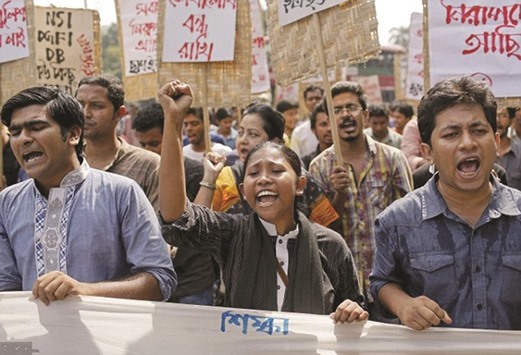Legal action to drop Islam as Bangladesh’s state religion has been revived after 28 years, and the High Court has agreed to hear the case later this month.
Bangladesh’s 1971 constitution originally declared all religions were equal in the eyes of the state. However, military ruler Hussain Mohammad Ershad amended it in 1988 to make Islam the state religion.
Ershad’s action led a group of 12 citizens to file a writ with the High Court to overturn the amendment. But Shahriar Kabir, who convened the group, said the members soon decided not to go ahead with the case.
“After filing the case, we realised that the bench would not be favourable for us, so we did not move further,” Shahriar said yesterday.
Then the current government, led by Prime Minister Sheikh Hasina, again amended the constitution. The new amendment reinstated the principle of secularism but also reaffirmed Islam as the state religion.
The court action brought by Shahriar’s group essentially seeks to resolve that contradiction. The High Court will hear the case on March 27.
“It will take long time to get any decision,” said Rana Dasgupta, a government prosecutor. “The nature of the case is time-consuming. The High Court will continue to hear from both parties and then will deliver its verdict.”
The move to reaffirm Bangladesh as a secular nation comes amid a wave of militant violence in recent months, including a series of bomb attacks against mosques and Hindu temples.
Some of the attacks, including the killing of a Hindu priest, have been claimed by Islamic State (IS). The militant group has also said it was behind the killings of a Japanese citizen, an Italian aid worker and a policeman.
Meanwhile the US has also warned that IS is stepping up recruitment in Bangladesh, even though the government says the extremist problems are home grown.
One Bangladesh police official said: “We have made arrests on each and every so-called IS-claimed attack.
“The attackers have confessed their crimes in court. They have also confessed being a Jamaatul Mujahedin Bangladesh member, and denied any linkage with IS.”
However an American director of National Intelligence has insisted attacks were the work of terrorist groups.
In a written testimony to the US Senate James Clapper noted the claims of responsibility from IS for 11 high profile attacks on foreigners and religious minorities, and claims from the Ansarullah Bangla Team and Al Qaida in the Indian Subcontinent for killing at least 11 progressive writers and bloggers in Bangladesh since 2013.
Bangladesh has been in political ferment since the run-up to January 2014 elections.
They were boycotted by opposition parties, and over war crimes prosecutions brought against Jamaat-e-Islami leaders over alleged involvement in atrocities during Bangladesh’s 1971 war of independence.
Muslims make up some 90% of Bangladesh’s population, while Hindus account for 8% and other religions — including Buddhism and Christianity — make up the rest.

Demonstrators protest against an extremist-related attack in Dhaka. The country is now considering dropping Islam as the state religion.
